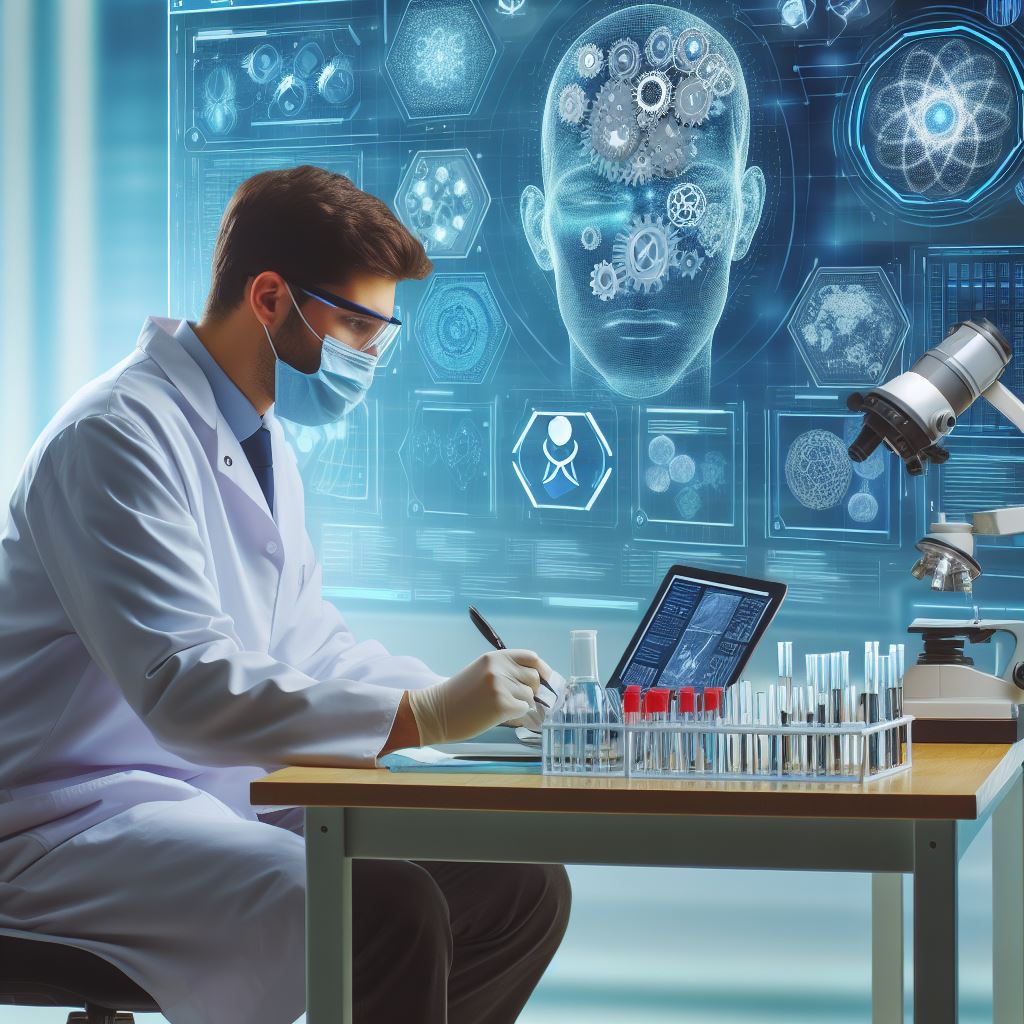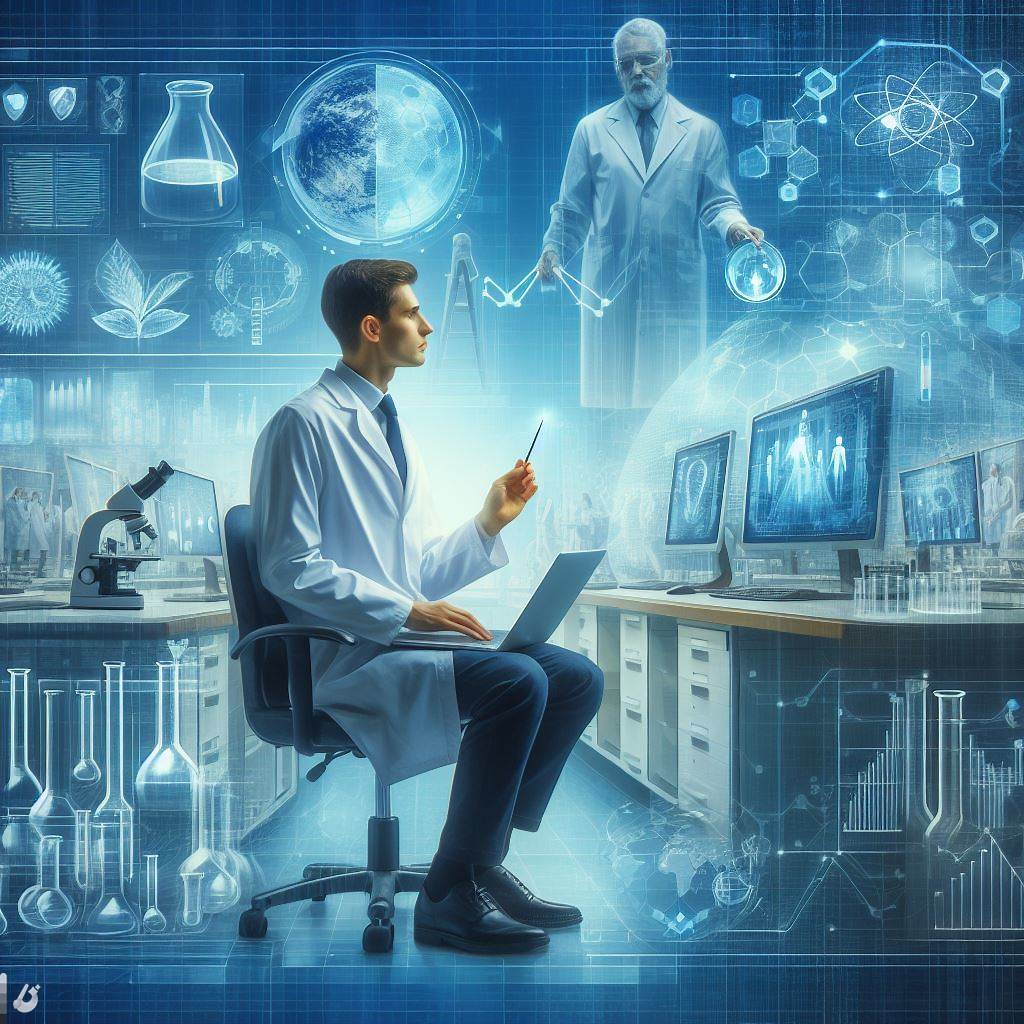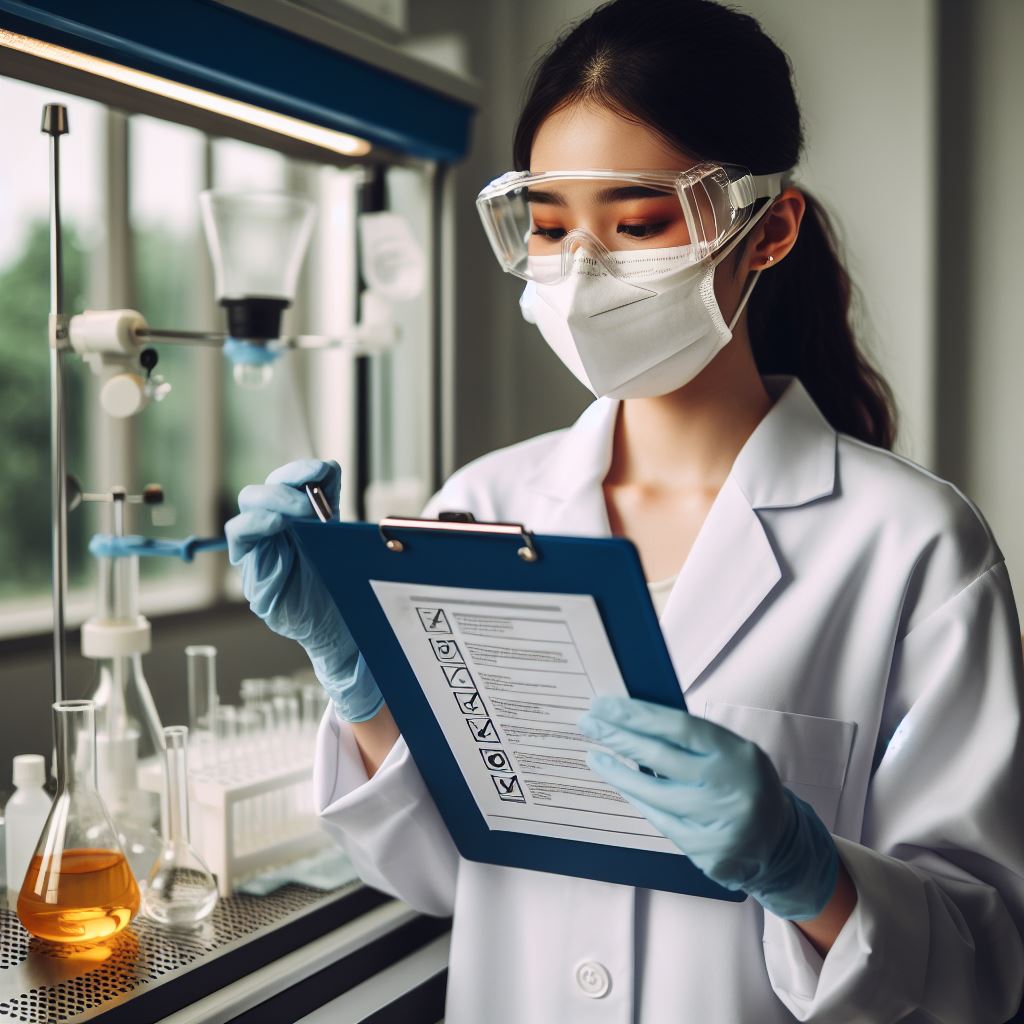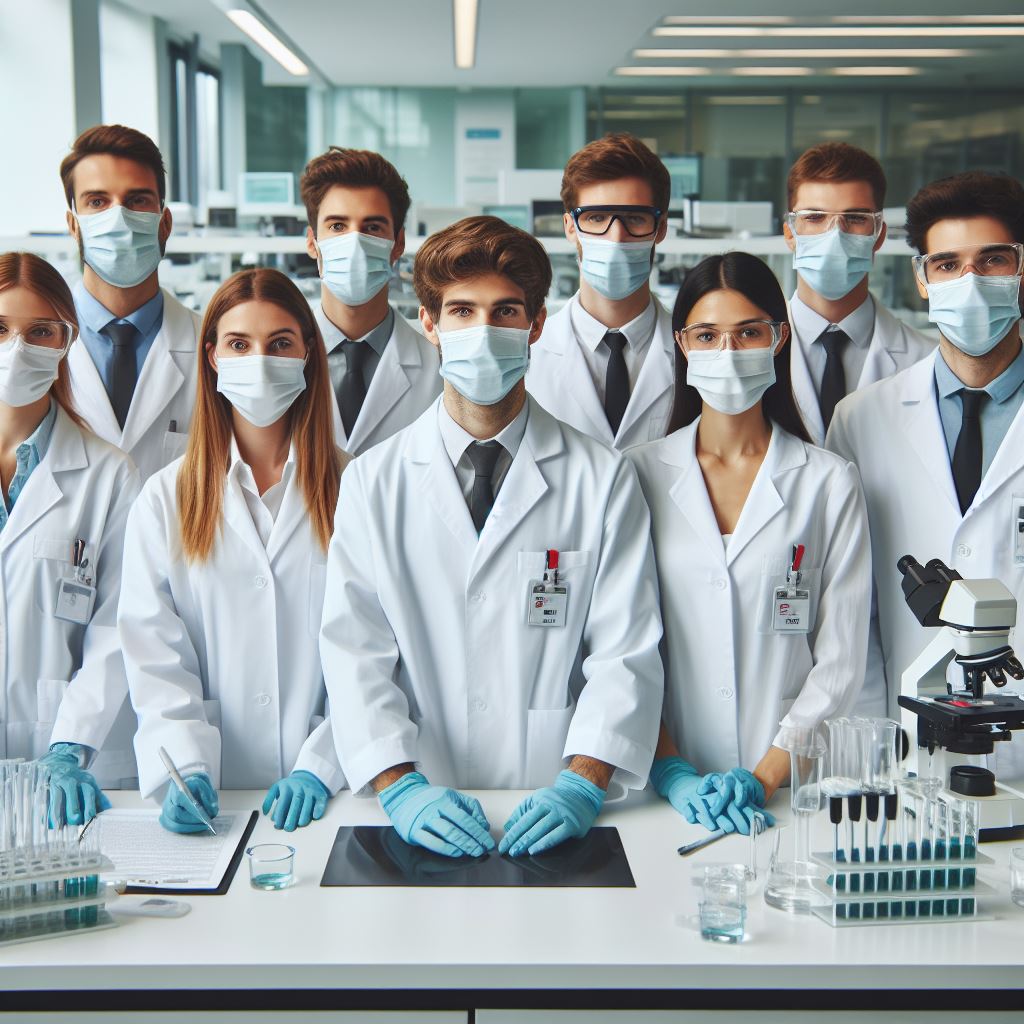Introduction
Lab tech specializations are crucial in various fields due to the increasing demand for skilled lab technicians.
They play a crucial role in scientific research and medical diagnostics, specializing in various fields to enhance precision and efficiency.
These specializations encompass areas such as clinical pathology, microbiology, genetics, and hematology.
Each specialization equips technicians with distinct skills and knowledge tailored to specific laboratory tasks, ensuring accurate analysis and diagnosis.
Their expertise contributes to advancements in medical treatments, disease detection, and research breakthroughs.
In the dynamic landscape of healthcare and research, lab tech specializations are indispensable, driving innovation and progress in understanding and addressing complex scientific challenges.
The demand for lab technicians is escalating across diverse fields such as healthcare, research, and technology.
In healthcare, diagnostic laboratories require skilled technicians for conducting tests and analyses crucial for patient care.
Similarly, the expanding realms of scientific research, including biotechnology and pharmaceuticals, necessitate proficient lab professionals.
Additionally, advancements in technology and the emergence of new industries like environmental testing and forensic science contribute to the rising need for skilled lab technicians.
This growing demand underscores the pivotal role these professionals play in maintaining and advancing various sectors, emphasizing the critical importance of their expertise in today’s evolving scientific landscape.
Overview of Lab Tech Specializations
Lab tech specializations are specific areas of focus within the laboratory field. These specializations allow lab technicians to develop expertise in a particular area of study or practice.
Specializations play a crucial role in different fields as they ensure that lab technicians have in-depth knowledge and skills in a specific area, allowing them to perform specialized tests and procedures.
The importance of specialized knowledge and skills in the laboratory cannot be overstated.
Lab technicians with specialized expertise can provide more accurate and reliable results, leading to better diagnoses and treatment plans for patients.
Lab tech specializations and their role in different field
Here are some common lab tech specializations:
- Clinical Chemistry: Lab technicians specializing in clinical chemistry focus on analyzing body fluids and tissues to diagnose and monitor medical conditions. They perform tests to measure levels of various substances such as glucose, cholesterol, and electrolytes.
- Hematology: Hematology specialists examine blood samples to identify and assess blood disorders such as anemia, leukemia, and clotting disorders. They analyze the components of blood, including red and white blood cells, platelets, and clotting factors.
- Microbiology: Lab techs specializing in microbiology study microorganisms such as bacteria, viruses, and fungi. They perform tests to identify infectious diseases and help determine the most appropriate course of treatment.
- Immunology: Immunology specialists analyze the immune system and its response to diseases. They perform tests to detect autoimmune disorders, allergies, and infections, as well as monitor the effectiveness of treatments.
- Genetics: Lab technicians specializing in genetics study DNA and its role in inherited diseases and traits. They perform tests to diagnose genetic disorders, assess the risk of developing certain conditions, and help determine appropriate treatment options.
More Lab tech specializations and their role
Other lab tech specializations include:
- Toxicology: Analyzing and identifying toxic substances in body fluids and tissues.
- Histology: Preparing and examining tissue samples to aid in the diagnosis of diseases.
- Cytology: Evaluating cells obtained from body fluids or tissues for cancer or other abnormalities.
- Pathology: Examining organs, tissues, and bodily fluids to diagnose diseases and determine the cause of death.
- Forensic Science: Applying scientific methods to gather and analyze evidence for use in legal investigations.
Each specialization requires specific knowledge, skills, and expertise. Lab technicians undergo specialized training, often through certification programs, to acquire the necessary proficiency in their chosen area of focus.
By specializing in a particular field, lab technicians can contribute more effectively to patient care, research, and advancements in their respective domains.
Specialized lab techs play a vital role in providing accurate diagnoses, monitoring treatment efficacy, and assisting in the development of new medical technologies and treatments.
Medical Lab Technology
Medical Lab Technology is a specialized field that plays a vital role in the healthcare industry. These professionals work behind the scenes, performing tests and procedures that help diagnose and treat diseases.
Specialization of Medical Lab Technology
In the world of medical lab technology, there are several specializations that technicians can pursue. Some common areas of specialization include:
- Clinical Chemistry
- Microbiology
- Hematology
- Immunology
- Pathology
Each specialization focuses on a specific aspect of laboratory testing, allowing technicians to develop expertise in their chosen area.
Duties and Responsibilities of Medical Lab Technicians:
Medical lab technicians have a wide range of duties and responsibilities. Some of the key tasks they perform include:
- Collecting and analyzing samples such as blood, urine, and tissue for testing
- Operating laboratory equipment to perform tests and procedures
- Interpreting test results and communicating findings to medical professionals
- Maintaining and calibrating lab equipment
- Ensuring quality control and adherence to safety protocols
These technicians play a crucial role in providing accurate and reliable test results that aid in disease diagnosis and treatment.
Unlock Your Career Potential
Visualize a clear path to success with our tailored Career Consulting service. Personalized insights in just 1-3 days.
Get StartedExamples of Medical Lab Tests and Procedures:
Medical lab technicians perform a variety of tests and procedures to aid in patient care. Some examples include:
- Complete Blood Count (CBC): Measures different components of blood, such as red and white blood cells
- Urinalysis: Examines urine for abnormalities, such as infections or kidney disorders
- Microbiology Cultures: Identifies and analyzes microorganisms that cause infections
- Coagulation Testing: Evaluates blood clotting ability
- Chemistry Panels: Assess organ function and measure electrolyte levels
These are just a few examples of the many tests and procedures that medical lab technicians perform on a daily basis.
In essence, medical lab technology offers a rewarding career path with various specializations to choose from.
The skilled technicians in these fields play a crucial role in the healthcare system, helping to diagnose and treat diseases through their expertise in laboratory testing.
Their duties include sample collection, test performance, and result interpretation.
By specializing in areas such as clinical chemistry, microbiology, or immunology, technicians can develop a deep knowledge in their chosen field.
They conduct a wide range of tests and procedures, providing valuable information to medical professionals.
Medical lab technology is a dynamic and ever-evolving field that continues to advance healthcare for the benefit of patients worldwide.
Read: Career Paths: From Biologist to Biochemist
Clinical Chemistry
Clinical chemistry is a specialized field in laboratory technology that focuses on analyzing blood and bodily fluids to diagnose and monitor diseases.
It plays a vital role in healthcare by providing valuable information for patient care and treatment.
Explanation of Specialization
In clinical chemistry, lab technicians perform a wide range of tests to analyze the chemical components of blood and other body fluids.
They use advanced laboratory instruments and follow strict protocols to ensure accurate and reliable results.
These lab technicians specialize in the analysis and interpretation of biochemical markers, including glucose, cholesterol, electrolytes, enzymes, hormones, and drugs.
They are experts in determining the concentrations of these substances in the body and understanding their implications on health and disease.
Importance in Diagnosing and Monitoring Diseases
Clinical chemistry is essential in diagnosing and monitoring various diseases.
By analyzing specific biomarkers, lab technicians can detect abnormalities in the body’s biochemical processes, providing crucial information for physicians and helping them make accurate diagnoses.
For example, abnormal levels of glucose in the blood can indicate diabetes, while elevated cholesterol levels may suggest cardiovascular disease.
By identifying such abnormalities, lab technicians contribute to the early detection and prevention of potentially life-threatening conditions.
Besides diagnosis, clinical chemistry also plays a vital role in monitoring the progression and treatment of diseases.
Lab technicians track changes in biomarker levels over time, providing valuable information for adjusting medications and assessing the effectiveness of therapies.
Common Tests Performed by Clinical Chemistry Lab Technicians
Clinical chemistry lab technicians perform a wide range of tests to analyze different biochemical markers. Some of the most common tests conducted in this field include:
- Glucose Tolerance Test (GTT) – measures how well the body metabolizes glucose.
- Lipid Profile – assesses cholesterol levels and evaluates the risk of cardiovascular diseases.
- Electrolyte Panel – measures levels of essential ions in the blood, such as sodium, potassium, and calcium.
- Liver Function Tests (LFTs) – evaluates liver health by assessing enzyme levels, bilirubin, and albumin.
- Renal Function Tests (RFTs) – measures markers like creatinine, blood urea nitrogen (BUN), and electrolytes to evaluate kidney function.
- Thyroid Function Tests (TFTs) – assesses hormone levels to diagnose thyroid disorders.
- Drug Screening – detects the presence of drugs or their metabolites in the body.
These are just a few examples of the extensive range of tests performed by clinical chemistry lab technicians. Each test provides valuable information regarding specific aspects of a patient’s health.
Generally, clinical chemistry is a specialized field within laboratory technology that focuses on analyzing blood and bodily fluids.
Lab technicians in this field play a vital role in diagnosing and monitoring diseases, providing valuable information for patient care and treatment.
Read: Canadian Biologists and Climate Change Research

Microbiology: Exploring the World of Lab Technology
In the field of lab technology, one specialization that holds immense importance is microbiology. Let’s dive into the fascinating world of microbiology and understand its significance in healthcare and research.
The Specialization of Microbiology
- Microbiology focuses on the study of microorganisms, including bacteria, viruses, fungi, and parasites.
- Lab technicians specialized in microbiology perform various tests and experiments to identify and understand these microorganisms.
- These professionals play a critical role in preventing, diagnosing, and treating infectious diseases.
The Significance of Microbiology in Healthcare and Research
Microbiology holds great significance in the healthcare and research sectors. Here’s why it matters:
- Disease Diagnosis: Microbiology lab technicians assist in identifying the causative agents of diseases, helping doctors in accurate diagnosis.
- Infection Control: By studying microorganisms, lab technicians contribute to the development of effective infection control measures.
- Antimicrobial Resistance: Microbiology research helps in understanding and combating resistance to antibiotics, an urgent global concern.
- Biomedical Research: Microbiology enables the study of biological processes at a cellular and molecular level, aiding in medical advancements.
Techniques and Tests Used by Microbiology Lab Technicians
Microbiology lab technicians employ a range of techniques and tests to analyze microorganisms. Here are some commonly used ones:
- Microscopy: Microbiologists use microscopes to visualize microorganisms and study their morphology and structure.
- Culture Techniques: Lab technicians culture microorganisms on specific growth media to identify and characterize them.
- Sterilization: Maintaining sterile conditions is essential in microbiology labs to prevent contamination of samples.
- Molecular Techniques: Polymerase Chain Reaction (PCR) and DNA sequencing help in identifying and studying specific microorganisms.
- Antibiotic Sensitivity Testing: Lab technicians determine the susceptibility of microorganisms to various antibiotics, aiding in treatment decisions.
- Quality Control: Microbiology labs follow strict quality control measures to ensure accuracy and reliability of test results.
Microbiology lab technology is a specialized field that combines scientific knowledge, technical expertise, and meticulous attention to detail.
Lab technicians specializing in microbiology contribute significantly to healthcare and research, making a difference in the prevention and management of diseases.
Next time you visit a hospital or research institution, take a moment to appreciate the valuable work done by microbiology lab technicians behind the scenes.
Read: Internship Opportunities for Biologists in Canada
Gain More Insights: Lab Technician Salaries Across Canada Compared
Find Out More: The Role of AI in Environmental Science Today
Forensic Science: Specializations, Tasks, and Tools
In the field of forensic science, laboratory technicians specialize in various areas to aid in crime scene investigation and analysis.
Let’s explore the different specializations of lab techs in forensic science, the role they play in crime scene investigations, and the techniques and tools commonly used in forensic science laboratories.
Specializations of Lab Techs in Forensic Science
- Forensic Biology: Lab techs specializing in forensic biology analyze biological evidence such as blood, hair, and bodily fluids.
- Forensic Chemistry: These techs analyze chemical substances found at crime scenes, including drugs and trace elements.
- Digital Forensics: Lab techs specializing in digital forensics recover and analyze data from electronic devices like computers and mobile phones.
- Toxicology: Techs in this specialization analyze body fluids and tissues to detect drugs, alcohol, and other toxins.
Role of Forensic Lab Technicians in Crime Scene Investigation and Analysis
Forensic lab technicians play a crucial role in crime scene investigations and analysis.
They assist in collecting, preserving, and analyzing evidence, and their findings often provide crucial information for legal proceedings. These technicians:
- Document the crime scene and collect evidence, ensuring proper handling and storage to maintain the integrity of the samples.
- Perform various tests and experiments on collected samples using specialized techniques and equipment.
- Analyze and interpret the results to determine the presence of substances, identify individuals, or reconstruct the crime scene.
- Prepare detailed reports and testify in court as expert witnesses when required.
Common Techniques and Tools Used in Forensic Science Laboratories
Forensic science laboratories utilize a range of techniques and tools to examine evidence and provide accurate analysis. Some commonly used techniques and tools include:
- Microscopy: Different types of microscopes are used to examine microscopic evidence, such as fibers, hairs, and stains.
- DNA Profiling: Polymerase Chain Reaction (PCR) is employed to analyze DNA samples and create DNA profiles for comparison.
- Chromatography: Various chromatographic techniques, including gas chromatography and liquid chromatography, separate and analyze chemical substances.
- Spectroscopy: Techniques like infrared spectroscopy and mass spectrometry identify and analyze the chemical composition of substances.
- Forensic Imaging: Specialized tools such as UV light, lasers, and alternative light sources enhance the visualization of evidence.
- Impression Analysis: Lab techs use techniques like fingerprint analysis, footwear impression analysis, and tire track analysis to identify individuals or vehicles.
In fact, forensic science offers numerous specializations for lab technicians.
These professionals play an integral role in crime scene investigations, utilizing a variety of techniques and tools to analyze evidence accurately.
Their expertise and findings contribute significantly to the criminal justice system, helping to uncover the truth and bring justice to victims and their families.
Read: The Future of Biology Jobs in Canada
Environmental Science
Lab technicians specializing in environmental science play a crucial role in ensuring the safety and sustainability of our environment.
These specialized professionals conduct various tests and analyses to assess air, water, and soil quality, providing important data for policymakers and scientists.
The Specialization of Lab Techs in Environmental Science
Environmental science lab technicians focus their expertise on studying the impact of human activities on the natural environment.
They are trained to perform a range of tests and experiments, using specialized equipment and techniques unique to this field.
These lab technicians can specialize in different areas within environmental science, including:
- Air Quality Analysis: Lab techs specializing in air quality analysis monitor and assess air pollutants, including both indoor and outdoor air quality.
- Water Quality Testing: Lab techs specializing in water quality testing analyze samples from various sources, such as rivers, lakes, and drinking water supplies, to ensure compliance with safety standards.
- Soil Testing and Analysis: Lab techs specializing in soil testing and analysis evaluate the composition and contamination levels of soil, providing valuable insights for agriculture, construction, and land remediation projects.
The Importance of Environmental Lab Testing and Analysis
Environmental lab testing and analysis are fundamental to understanding the health and sustainability of our environment. Here are a few reasons why this work is vital:
- Identifying Pollutants: Lab testing helps identify pollutants in the environment, allowing scientists to understand their sources and potential dangers to human and ecological health.
- Monitoring Regulatory Compliance: Environmental lab tests help ensure that industries, municipalities, and individuals are adhering to environmental regulations and standards.
- Evaluating Environmental Impacts: Lab analysis provides data on the impacts of human activities on the environment, helping scientists and policymakers make informed decisions about resource management and conservation.
The Contribution of Environmental Lab Technicians
Environmental lab technicians contribute significantly to the field of environmental science and its related sectors:
- Collecting Samples: Lab techs collect samples of air, water, soil, and other environmental elements according to established protocols. These samples form the basis for further analysis and testing.
- Conducting Experiments and Tests: Lab techs perform a wide range of experiments and tests on collected samples, employing various analytical techniques and instruments.
- Interpreting and Analyzing Data: Environmental lab technicians analyze the data obtained from experiments and tests, interpreting the results to identify trends and patterns.
- Providing Accurate Reports: Lab techs generate comprehensive reports documenting their findings, ensuring that accurate information is available to policymakers, scientists, and other stakeholders.
Through their work, environmental lab technicians contribute to the scientific understanding of our environment and help in creating policies and practices that promote its protection and preservation.
In general, an environmental science lab technician’s specialization is crucial in assessing and maintaining the quality of our air, water, and soil.
Their work ensures the sustainability of our environment and provides essential data for decision-making, making them indispensable contributors in the field of environmental science.
Conclusion
There are several lab tech specializations available for individuals to pursue. These include fields such as microbiology, toxicology, genetics, and forensic science, among others.
Each specialization plays a vital role in different industries and research areas.
Specialized lab technicians are crucial in ensuring the accuracy and efficiency of scientific experiments and tests.
Their expertise and knowledge in their specific field help in obtaining reliable results and contributing to advancements in various sectors, such as healthcare, agriculture, and environmental science.
If you are interested in pursuing a career in the laboratory sciences, considering a specialization is highly recommended.
By choosing a field that aligns with your interests and career goals, you can develop expertise that will set you apart from other lab technicians and open up exciting opportunities.
Whether it is exploring the mysteries of DNA or analyzing crime scenes, specialized lab technicians make a significant impact on society.
They play a vital role in scientific discoveries, medical breakthroughs, and maintaining public health and safety.
So, if you have a passion for science and a desire to make a difference, consider exploring the world of lab tech specializations.
Your expertise could contribute to groundbreaking research and advancements that benefit society as a whole.




